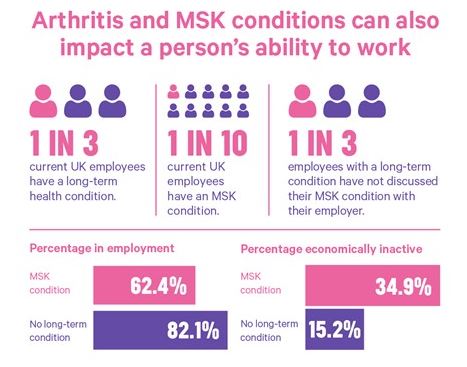As many as one in 10 employees has a musculoskeletal condition, of which one in three is simply struggling through it because they do not want to discuss their health needs with their employer.
A study by the charity Versus Arthritis has highlighted the ‘state of the nation’ when it comes to musculoskeletal health.
The report, The State of Musculoskeletal Health, has synthesised the most up-to-date, UK-wide statistics on arthritis and other musculoskeletal (MSK) conditions, the charity has said.
Employees with musculoskeletal conditions
Health support service sees rise in cancer and musculoskeletal referrals
Why are musculoskeletal disorders still an issue for employers?
It has concluded that around a third of the UK population, or more than 20 million people (20,295,706), are living with an MSK condition. This equates to 11.6 million women and 8.7 million men, of all ages, it has calculated.
Some 10 million people have osteoarthritis (OA), an estimated 5.4 million people have knee OA, and an estimated 3.2 million people have hip OA.
A total of 450,000 adults have a recorded diagnosis of rheumatoid arthritis, and 190,000 adults are estimated to have psoriatic arthritis.
When it comes to the impact of having arthritis or a person’s ability to work, people with arthritis are 20% less likely to be in work than someone without arthritis. In 2021, 23.3 million working days were lost because of MSK conditions.
People with arthritis and MSK conditions often take medicines to help manage their symptoms. In 2021-2022, around 30 million prescriptions were dispensed for MSK conditions and joint diseases in England, costing approximately £151m.
Those with arthritis and MSK conditions are also more likely to contact and use primary healthcare, secondary healthcare, and community healthcare such as physiotherapy, the charity concluded.
MSKs account for 1.08 million hospital admissions and one in seven GP consultations, it added.
People who live in the most deprived fifth of society are more likely to report arthritis or a long-term MSK condition compared to those living in the least deprived fifth.
Deprivation is also linked to chronic pain. Four in 10 people (41%) who live in the most deprived fifth of society in England report chronic pain compared with three in 10 (30%) in the least deprived quintile.
The prevalence of MSK conditions differs between people from some different ethnic groups, Versus Arthritis has said.
Sign up to our weekly round-up of HR news and guidance
Receive the Personnel Today Direct e-newsletter every Wednesday
Those most likely to report a long-term MSK condition in England are people from a Pakistani ethnic group (20.8%), Black Caribbean ethnic group (18.7%), White British ethnic group (16.8%) and Black African ethnic group (15.4%).
Women from Pakistani ethnic backgrounds have the highest prevalence of MSK conditions, the report added.

